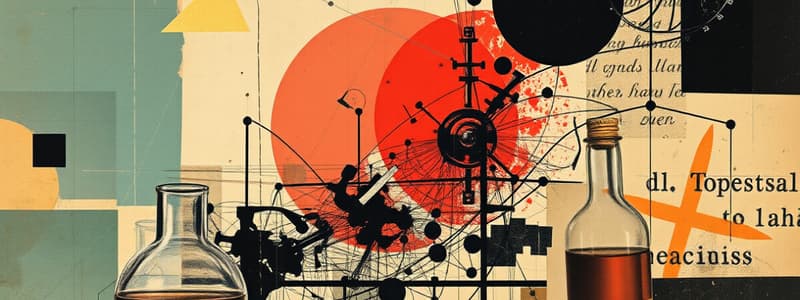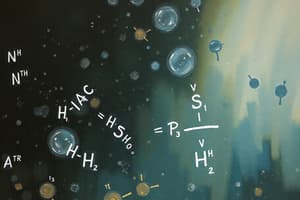Podcast
Questions and Answers
The nature of the reactants affects the reaction rates, including their state such as gas, liquid or ______.
The nature of the reactants affects the reaction rates, including their state such as gas, liquid or ______.
solid
An increase in the initial concentration or pressure of the reactants will increase the rates of the ______.
An increase in the initial concentration or pressure of the reactants will increase the rates of the ______.
reaction
An increase in temperature will lead almost to an increase in the rate of the reaction in which the ______ occurs.
An increase in temperature will lead almost to an increase in the rate of the reaction in which the ______ occurs.
reaction
The use of a ______ can help speed up the reaction.
The use of a ______ can help speed up the reaction.
The medium of the reaction can be either polar or ______.
The medium of the reaction can be either polar or ______.
Reaction rate is proportional to the concentration of the ______.
Reaction rate is proportional to the concentration of the ______.
Increasing the concentration directly increases the collision ______, which increases the rate.
Increasing the concentration directly increases the collision ______, which increases the rate.
As the number of particles increases, the rate of the reaction ______.
As the number of particles increases, the rate of the reaction ______.
Flashcards are hidden until you start studying
Study Notes
Factors Affecting Reaction Rates
- Nature of reactants influences reaction rates; states include gas, liquid, solid, ions, molecules, or free radicals.
- Concentration or pressure: Increasing the initial concentration or pressure typically increases reaction rates, except in zero-order reactions.
- Temperature: An increase in temperature generally leads to a higher reaction rate due to enhanced molecular interactions.
- Catalysts: The presence of a catalyst can speed up reactions; its surface nature plays an important role.
- Reaction medium: The medium can be polar or nonpolar, frequently involving water; the choice affects the reaction dynamics.
Collision Theory
- Reactions require molecular collisions; more frequent collisions lead to higher reaction occurrences.
- Reaction rate is directly proportional to reactant concentration, implying that increasing concentration raises collision frequency, thus increasing the rate.
Kinetic Considerations
- Higher pressure and concentration correlate with faster reaction rates; more molecules result in more collisions.
- As the number of reactant particles increases, the reaction rate increases; conversely, fewer particles lead to a decreased rate due to reduced collision opportunities.
Studying That Suits You
Use AI to generate personalized quizzes and flashcards to suit your learning preferences.


